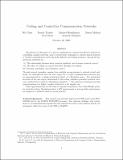Coding and Control for Communication Networks
Author(s)
Medard, Muriel; Ozdaglar, Asuman E.; Chen, Wei; Traskov, Danail; Heindlmaier, Michael; Meyn, Sean P.; ... Show more Show less
DownloadMedard_Coding and.pdf (840.2Kb)
OPEN_ACCESS_POLICY
Open Access Policy
Creative Commons Attribution-Noncommercial-Share Alike
Terms of use
Metadata
Show full item recordAbstract
The purpose of this paper is to survey techniques for constructing effective policies for controlling complex networks, and to extend these techniques to capture special features of wireless communication networks under different networking scenarios. Among the key questions addressed are:
(i) The relationship between static network equilibria, and dynamic network control.
(ii) The effect of coding on control and delay through rate regions.
(iii) Routing, scheduling, and admission control.
Through several examples, ranging from multiple-access systems to network coded multicast, we demonstrate that the rate region for a coded communication network may be approximated by a simple polyhedral subset of a Euclidean space. The polyhedral structure of the rate region, determined by the coding, enables a powerful workload relaxation method that is used for addressing complexity—the relaxation technique provides approximations of a highly complex network by a far simpler one.
These approximations are the basis of a specific formulation of an h-MaxWeight policy for network routing. Simulations show a 50% improvement in average delay performance as compared to methods used in current practice.
Date issued
2009-12Department
Massachusetts Institute of Technology. Department of Electrical Engineering and Computer Science; Massachusetts Institute of Technology. Research Laboratory of ElectronicsJournal
Queuing systems
Publisher
Springer ; Operations Research Society of America
Citation
Chen, Wei et al. “Coding and control for communication networks.” Queueing Systems 63.1 (2009): 195-216. © 2009, Springer Science + Business Media
Version: Author's final manuscript
ISSN
0257-0130